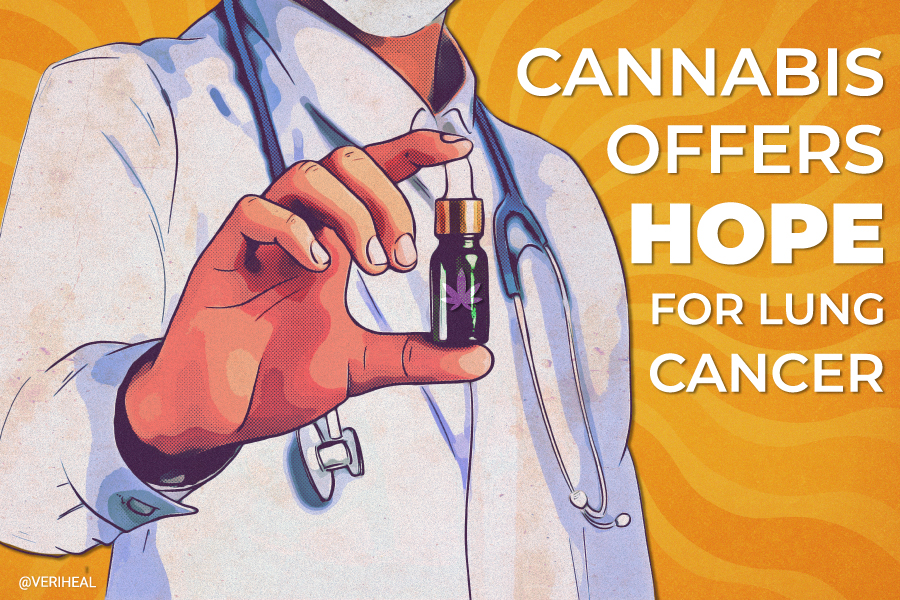Were you aware of the fact that lung cancer is the leading global cause of cancer death? This is according to the Lung Cancer Research Foundation, which also claims that 130,180 American lives are lost to the deadly disease every year. Fortunately, the incidence rate of lung cancer is declining steadily in men (2.8% annually) and women (1.4% annually) across the United States.
Cannabis, a plant with many uses in the medical field, could help to shrink tumors in lung cancer patients. This is based on previous studies and a recent study that was featured in BMJ Journals.
Doctors Observe Patient’s Tumor Regression
The subject of using cannabis to treat cancer is being discussed more openly nowadays, with more success stories transpiring all of the time. One of the more recent medical cannabis success stories was presented by a team of researchers who followed the story of a girl who self-administered cannabidiol (CBD) 2-3 times per day.
Titled “Lung cancer patient who had declined conventional cancer treatment: could the self-administration of ‘CBD oil’ be contributing to the observed tumor regression?,” the case report was published on Oct. 14, 2021. As noted by the researchers, lung cancer patients are usually treated with a mixture of methods, such as chemotherapy, radiotherapy, and surgery. Unfortunately, such treatments usually prove difficult to bear for the people who undergo them.
When offered conventional lung cancer treatment, the patient who was presented in this recently published case report refused—a decision that potentially saved her life. After self-administering CBD oil, which is a psychoactive but non-intoxicating extract of the cannabis plant, the patient and doctors observed her cancerous tumor shrinking over the course of two-and-a-half years to just 10 millimeters. Before using CBD for lung cancer, the patient’s tumor measured 41 millimeters.
Cannabinoids Prove to Be Promising for Cancer
Cannabis compounds, better known as “cannabinoids,” are not chemically dissimilar to the endocannabinoids that are naturally produced by the human body. Both types of chemicals can react with signaling pathways in the endocannabinoid system (ECS).
Once the pathways are triggered, they influence a broad range of mechanisms inside the human body, including how cancer cells function. In simple terms, cannabinoids are capable of regulating the way in which cells receive, send, and process messages.
Cannabinoids are being used more frequently in palliative care than ever before. Examples of some potential benefits of cannabinoids in cancer care include increased appetite, reduced nausea, and pain relief. What’s more, the anti-tumor effects of cannabinoids have been demonstrated in a growing number of animal studies.
Why You Should Get Your Medical Marijuana Card
Veriheal has satisfied millions of patients nationwide by giving them access to these benefits
- Larger purchase limits
- Peace of mind
- Enhanced legal protection
- Access to higher potency strains
- Save up to 25% on cannabis purchases
- Skip the line at the dispensary
The great thing about cannabinoids is that they can be administered in a variety of ways, including orally, topically, and sublingually. One of the most impressive of all 114 cannabinoids that have, so far, been identified by scientists is CBD. Unlike tetrahydrocannabinol (THC), CBD is non-intoxicating.
Studies into CBD have shown that the cannabis compound possesses antiproliferative effects, meaning that it can inhibit cell-cycle pathways and cause apoptosis in various cells, including cancer cells. CBD, which generated $4.6 billion in revenue for the U.S. economy last year alone, also has pro-apoptotic effects.
Understanding the Main Causes of Lung Cancer
The first step to preventing lung cancer and caring for your health is quitting cigarette smoking (if you do). Based on statistics published by the Centers for Disease Control and Prevention (CDC), cigarette smoking is the leading risk factor for lung cancer. (It should be noted that while smoking cannabis has other risks, it has not been linked to lung cancer.)
In the U.S. alone, between 80% and 90% of lung cancer deaths are associated with cigarette smoke. Someone’s chances of being diagnosed with the often fatal disease also soar with the regular use of pipes, cigars, and other tobacco products, which are plagued with thousands of harmful chemicals.
Secondhand smoke is also a common culprit of lung cancer, as is radon—a type of gas that occurs naturally in water, soil, and rocks. If estimates from the U.S. Environmental Protection Agency (EPA) are correct, radon kills as many as 21,000 lung cancer patients on an annual basis.
Your risk of developing lung cancer is also likely to increase if your relatives, such as your mother and father, brothers or sisters, or children have been diagnosed with the disease at some point in their lives. There’s also a higher risk of lung cancer among cancer survivors who have had radiation therapy to the chest.
Conclusion
Chronic pain is the most commonly reported reason for patients who use medical cannabis. But this isn’t to say that medical cannabis can only benefit chronic pain patients. There are more cannabinoid receptors than other types of receptors in the brain, meaning that cannabis may work as the missing puzzle piece for patients who endure a broad spectrum of illnesses and diseases, including lung cancer.
Studies carried out in the past have drawn mixed conclusions on the subject of cannabinoids as a cancer treatment. However, the BMJ Journals case report clearly indicates that CBD oil is connected with tumor regression. On the other hand, more research is needed to fully understand the connection between cannabis and lung cancer.
Author, Share & Comments















